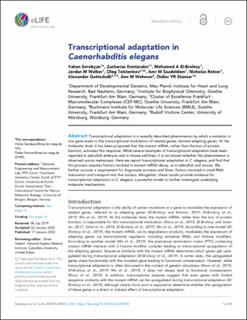Transcriptional adaptation in caenorhabditis elegans
Serobyan, Vahan; Kontarakis, Zacharias; El-Brolosy, Mohamed A.; Welker, Jordan M.; Tolstenkov, Oleg; Saadeldein, Amr M.; Retzer, Nicholas; Gottschalk, Alexander; Wehman, Ann M; Stainier, Didier YR
Journal article, Peer reviewed
Published version

Åpne
Permanent lenke
https://hdl.handle.net/11250/2727564Utgivelsesdato
2020-01Metadata
Vis full innførselSamlinger
Originalversjon
10.7554/eLife.50014Sammendrag
Transcriptional adaptation is a recently described phenomenon by which a mutation in one gene leads to the transcriptional modulation of related genes, termed adapting genes. At the molecular level, it has been proposed that the mutant mRNA, rather than the loss of protein function, activates this response. While several examples of transcriptional adaptation have been reported in zebrafish embryos and in mouse cell lines, it is not known whether this phenomenon is observed across metazoans. Here we report transcriptional adaptation in C. elegans, and find that this process requires factors involved in mutant mRNA decay, as in zebrafish and mouse. We further uncover a requirement for Argonaute proteins and Dicer, factors involved in small RNA maturation and transport into the nucleus. Altogether, these results provide evidence for transcriptional adaptation in C. elegans, a powerful model to further investigate underlying molecular mechanisms.
